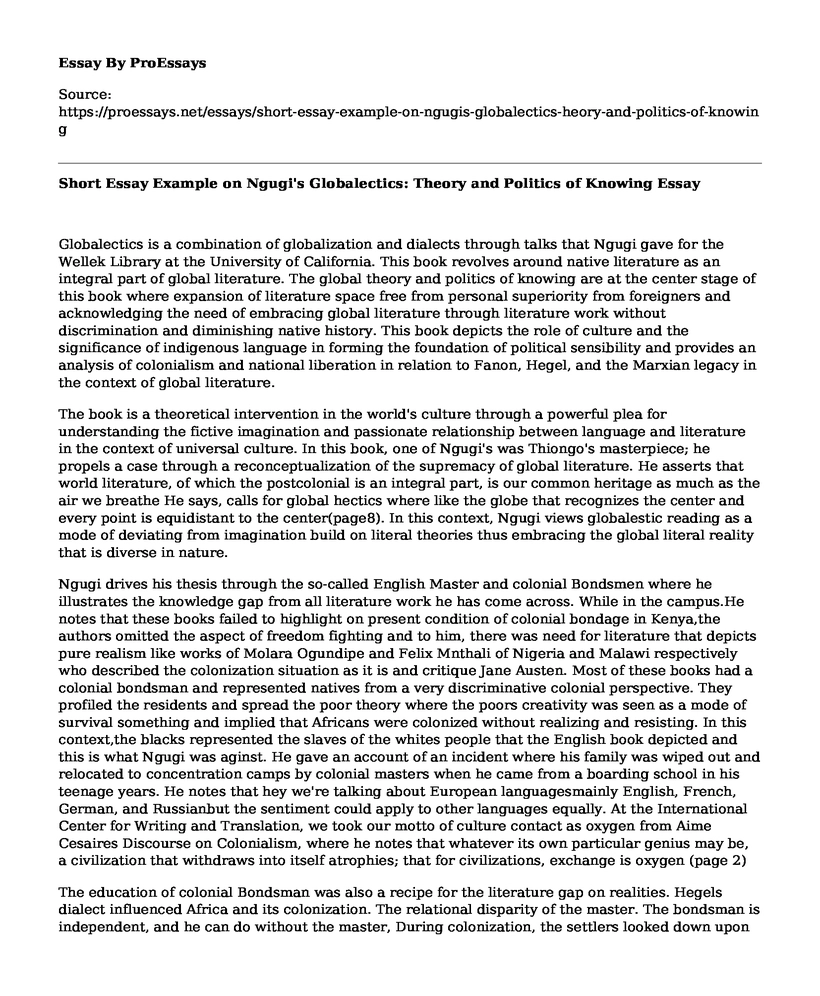Globalectics is a combination of globalization and dialects through talks that Ngugi gave for the Wellek Library at the University of California. This book revolves around native literature as an integral part of global literature. The global theory and politics of knowing are at the center stage of this book where expansion of literature space free from personal superiority from foreigners and acknowledging the need of embracing global literature through literature work without discrimination and diminishing native history. This book depicts the role of culture and the significance of indigenous language in forming the foundation of political sensibility and provides an analysis of colonialism and national liberation in relation to Fanon, Hegel, and the Marxian legacy in the context of global literature.
The book is a theoretical intervention in the world's culture through a powerful plea for understanding the fictive imagination and passionate relationship between language and literature in the context of universal culture. In this book, one of Ngugi's was Thiongo's masterpiece; he propels a case through a reconceptualization of the supremacy of global literature. He asserts that world literature, of which the postcolonial is an integral part, is our common heritage as much as the air we breathe He says, calls for global hectics where like the globe that recognizes the center and every point is equidistant to the center(page8). In this context, Ngugi views globalestic reading as a mode of deviating from imagination build on literal theories thus embracing the global literal reality that is diverse in nature.
Ngugi drives his thesis through the so-called English Master and colonial Bondsmen where he illustrates the knowledge gap from all literature work he has come across. While in the campus.He notes that these books failed to highlight on present condition of colonial bondage in Kenya,the authors omitted the aspect of freedom fighting and to him, there was need for literature that depicts pure realism like works of Molara Ogundipe and Felix Mnthali of Nigeria and Malawi respectively who described the colonization situation as it is and critique Jane Austen. Most of these books had a colonial bondsman and represented natives from a very discriminative colonial perspective. They profiled the residents and spread the poor theory where the poors creativity was seen as a mode of survival something and implied that Africans were colonized without realizing and resisting. In this context,the blacks represented the slaves of the whites people that the English book depicted and this is what Ngugi was aginst. He gave an account of an incident where his family was wiped out and relocated to concentration camps by colonial masters when he came from a boarding school in his teenage years. He notes that hey we're talking about European languagesmainly English, French, German, and Russianbut the sentiment could apply to other languages equally. At the International Center for Writing and Translation, we took our motto of culture contact as oxygen from Aime Cesaires Discourse on Colonialism, where he notes that whatever its own particular genius may be, a civilization that withdraws into itself atrophies; that for civilizations, exchange is oxygen (page 2)
The education of colonial Bondsman was also a recipe for the literature gap on realities. Hegels dialect influenced Africa and its colonization. The relational disparity of the master. The bondsman is independent, and he can do without the master, During colonization, the settlers looked down upon Africans with their history and viewed their education as superior and never considered natives history as a way of life and oral literature.They forced their education on Africans and punished those who resisted severely and even sentenced them to death. Ngugi illustrates the work of Shakespeare The Tempest and Defoes Robinson Crusoe to emphasize this point to show the relationship between the the colonial master and bondsman. Prospero and Crusoe, for instance, referred to themselves a Lord while the rest were serfs. They showed these through mannerism and language. This book depicts the magnitude of bondage colonial masters pressed on Africans. The colonial masters viewed themselves a god and Africans were there to serve them they treated their culture as superior.This should not be the case of global literature.
The subject of global euctical imagination was quite dominant to Ngugis views imagination as a significant influence when in world literature. He was able to predict the concept of world literature not inclined to continent and race.In this context, literature should value regional linguistic and cultural diversity and in this respect the audience is critical and the writer should embrace universal literature that is tolerant to global reception. In this case, writing should be comprehensive and should not be a confine of an individual group. Its theme should to be at the comfort of the authors circumstance, time and religion but rather rise beyond present reality and appeal to humanity globally world literature is here (page 2) even though people still look at it from narrow perspective, the colonial masters recognized with resistance that bondsman oral literature was as good as masters education and there is no knowledge that is greater than or better than the other hence both the linguistic merits should be studied without discrimination. In this case, global hectics presents both theory and personal history
Work Cited
Ngugi Wa Thiongo Globalectics: Theory and the Politics of Knowing. The Wellek Library Lectures,2012.
Cite this page
Short Essay Example on Ngugi's Globalectics: Theory and Politics of Knowing. (2021, Mar 31). Retrieved from https://proessays.net/essays/short-essay-example-on-ngugis-globalectics-heory-and-politics-of-knowing
If you are the original author of this essay and no longer wish to have it published on the ProEssays website, please click below to request its removal:
- Holden on to Existentialism: Catcher in the Rye Essay
- The Historical Importance of Olaudah Equiano's The African Narrative Essay
- Game Changer Identity: Toussaint's Last Words
- Research Paper on Medea Mythology
- WWII: Leadership Styles of Allied & Axis Powers - Essay Sample
- Essay Example on Septuagint: Ancient Greek Translation of the Bible
- Essay Sample on Olmecs: Mexico's Ancient Rubber People







